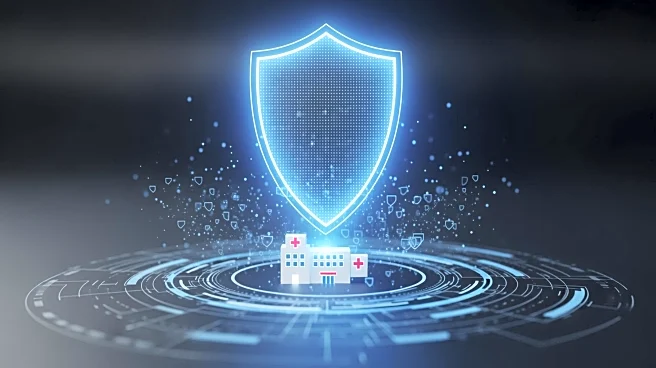What's Happening?
Healthcare organizations are facing an unprecedented rise in cybersecurity breaches, with a reported 256% increase over the past five years. These attacks, including ransomware, phishing, and supply chain
vulnerabilities, are becoming more sophisticated and frequent, posing significant risks to patient safety and operational continuity. The integration of technology in healthcare, such as IoMT devices and AI diagnostics, has expanded the digital footprint, creating more entry points for cybercriminals. Recent incidents have shown that cyberattacks can lead to real-world consequences, such as delayed surgeries and compromised diagnostics, which can be catastrophic in critical care environments. The financial impact is also severe, with the average cost of a healthcare data breach reaching $7.42 million, the highest among any industry.
Why It's Important?
The increasing frequency and sophistication of cyberattacks in healthcare highlight the urgent need for robust cybersecurity measures. These breaches not only threaten patient safety but also have significant financial implications, potentially eroding trust in healthcare providers. As healthcare systems become more interconnected, the risk of widespread disruption grows, emphasizing the need for a proactive approach to cybersecurity. Implementing recovery-focused cyber platforms can ensure continuity of care even during an attack, which is crucial for maintaining patient trust and safety. The shift from reactive to proactive security strategies could be the difference between life and death in healthcare settings.
What's Next?
Healthcare organizations are encouraged to adopt a cyber recovery-focused approach, which includes segmenting IT/OT systems, using real-time monitoring, and implementing air-gapped backups. Regular recovery drills and compliance with regulations like HIPAA and GDPR are essential to ensure resilience. As regulations evolve, healthcare providers must demonstrate rapid backup and recovery capabilities to meet compliance standards. The future of healthcare depends on operational continuity, and organizations that prioritize cyber resilience will be better positioned to protect patient safety and maintain trust.
Beyond the Headlines
The ethical implications of cyberattacks in healthcare are profound, as they directly impact patient care and safety. The legal landscape is also shifting, with regulations demanding proof of resilience and rapid recovery capabilities. Culturally, the trust between patients and healthcare providers is at stake, as breaches can lead to loss of confidence in the system. Long-term, the healthcare industry must adapt to the evolving threat landscape by integrating cybersecurity into every aspect of operations.








